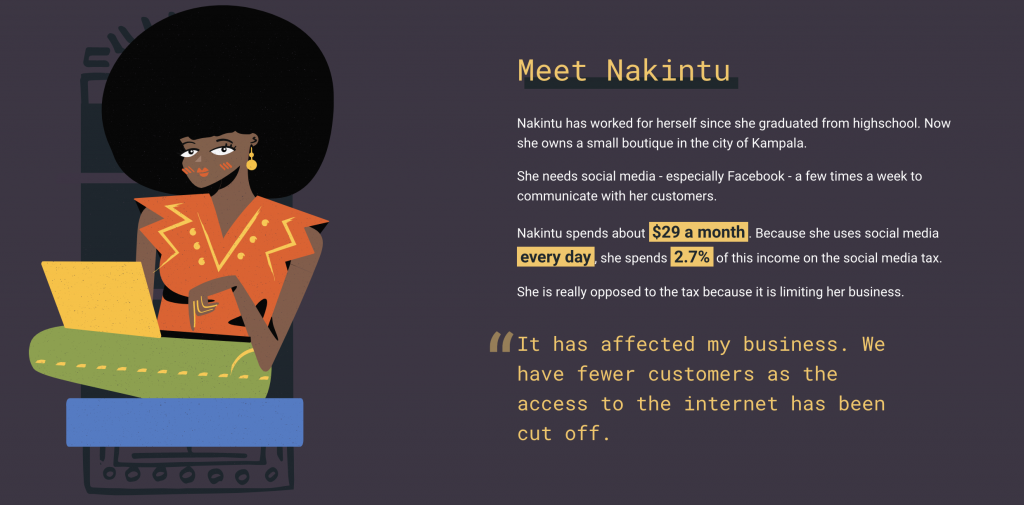ICTs and many other digital technologies have to the potential to transform our society and bring about massive social change through connectivity, access to information, faster communication and automation. So, we are inundated by success stories of digital development, but we need to also understand its failures. This is the second article in a critical series on when well-intended ICTs and online platforms miss the mark. It discusses a recent public notice in Uganda, which requires citizens to obtain “a license to post online,” which coupled with social media taxes further violates freedom of expression and access to information.
On 5 October 2020, another harbinger of slow death for Uganda’s internet and social media freedom came to fruition when the Uganda Communications Commission (UCC)—the national regulator of all communication services—officially imposed the requirement for all online content publishers, providers and broadcasters to obtain a license before sharing content with the public. Originally shared in a public notice released on 7 September 2020, the UCC advises that: “all persons currently offering or planning to commence the provision of online data communication and broadcasting services including but not limited to blogs, online televisions, online radios, online newspapers, audio over IP (AoIP), Internet Protocol TV (IPTV), Video on Demand (VoD), Digital Audio radios and televisions, internet/web radio and internet/web television, to obtain authorisation from UCC before providing such services to the public.” [1] This license fee applies to bloggers, YouTubers (vloggers), podcasters and any online content publishers.
For many bloggers, online publishers and human rights advocates the license represses their freedom of expression within the digital and online public sphere. For instance, in an interview with Voices of America (VOA), Ruth Aine, a Ugandan blogger, described that the license is motivated by avarice and a need for the government to regulate online conversations: “It’s just a way of restricting a number of people that are able to have conversations online…The other way is that they are just looking for money, the way that they introduced the OTT tax (Over the Top Tax) on social media.” [2] Additionally, Ivan Bwowe, a Ugandan human rights lawyer, petitioned the High Court of Uganda on grounds of the notice symbolizing infringement on constitutional rights. Bwowe’s petition argued that the notice is:” a violation of constitutionally guaranteed rights. I will also want an injunction by court to UCC and all state institutions not to fine, arrest or prosecute anyone who is considered to be in violation of that notice.”[3]
In 2019, when the UCC first introduced the license to register online publishers, the cost was approximately 73800 UGX ($20.00 USD) [4]—as of October 2020 the current fee is not confirmed. The online tax accompanies the Over-The-Top (OTT) tax introduced by the UCC in July 2018, which required social media users to pay a daily tax tariff for using platforms such as WhatsApp, Twitter, Instagram and Facebook. According to the campaign, Free Social Media—created by the digital media and advocacy organizations, Data4Change, DefendDefenders, and POLLICY,— due to OTT social media users in Uganda are required to pay about $0.05 USD a day to access social media[5]. The amount may seem minuscule, but on average the daily OTT accounts for 4% of monthly income for many Ugandans; and the tax burden is further exacerbated for women and citizens with no formal education. If a similar tax was required in the USA, it would be equivalent to paying $124 per month to access social media. Moreover, the tax affects how Ugandans communicate, post and share information, use mobile payment services and participate in mobile commerce on the internet and social media platforms.
Ugandans have a few options to pay tax OTT: daily, weekly, monthly, quarterly or annually. Whereas, utilizing the freedom of a Virtual Private Network (VPN) could help Ugandans circumvent to the tax requirement, the most reliable VPN services range from $8-10 USD, which already puts the average users at a financial disadvantage. Concerning VPNs, in July 2018, Godfrey Mutabazi, UCC former executive director, warned Ugandans about accessing expensive VPN services to evade OTT. Therefore, alternative options are limited.
OTT Widens the Digital Divide
Since OTT was introduced, social media usage dropped in Uganda. A case study on the effects of OTTs in Africa, sponsored by Mozilla and the African Union , found the launch Uganda’s OTT reduced internet usership by 30%.[6] In another study, A Shot in the Dark: The Impact of the Social Media Tax in Uganda on Access, Usage, Income and Productivity[7] POLLICY found post-OTT, 62% of respondents who used social media for business, reported a reduction in their income. POLLICY also predicted that the high cost of data and OTT in Uganda could further inequality between rich and poor user, especially women. Review the persona below, from POLLICY and the Free Social Media campaign, which describes how a Ugandan woman entrepreneur accesses social media within the context of OTT.

Regarding inequality, critical researchers of ICT4D such as, James Murphy and Pádraig Carmody, argue that ICT initiatives are often touted within related discourse for its potential to transform Africa’s economic and social development through innovation, democratization and access.[8] Yet, all ICT initiatives are not always a means to a transformative end—development.[9] So, what happens when the social and political power relations of the “physical” environment permeate the digital public sphere? What does it mean for freedom of ICT-based and internet-based communication, commerce and activism?
Specifically, the case of OTT and the online license fee in Uganda, reflect how though access to internet and social media provided Ugandans with low-cost communication networks and spaces to conduct digital business activities, UCC’s regulatory power shaped the end social, economic and gendered results for users. The impact of UCC’s decision could follow a decline in Uganda’s online publishing and sharing trends towards the end of 2020.
In conclusion, digital taxes remain an extremely controversial issue in Uganda: UCC views the taxes as a tool for safeguarding the affordances of the social media and the internet; rather Ugandans view the taxes as representations of restrictions on their access to digital platforms and freedom of expression. Do you think internet/social media death and taxes will be unavoidable in Uganda? Will OTT change how mobile and internet-based humanitarian initiatives are deployed in Uganda? Do you expect a trend in more countries adopting similar taxes in the future?
Notes:
- Uganda Communication Commission. (7 September 2020). Public Notice. Reminder to Providers of Online Data Communication and Broadcasting Services to Obtain Authorisation. Retrieved from: https://www.ucc.co.ug/reminder-to-providers-of-online-data-communication-and-broadcasting-services-to-obtain-authorisation/
- Athumani, H. (12 September 2020). Ugandan Online Users Protest New Regulation. Retrieved from: https://www.voanews.com/africa/ugandan-online-users-protest-new-regulation
- Kulabako, F. (16 September 2020). UCC move to tax online content, face opposition. Retrieved from: https://www.newvision.co.ug/news/1527106/ucc-tax-online-content-opposition
- Mubiru, A. (5 August 2019). UCC registers online publishers and influencers. Retrieved from: https://www.newvision.co.ug/news/1504833/ucc-registers-online-publishers-influencers
- Free Social Media. (2020). Social Media is Free. But not in Uganda. Retrieved from: https://freesocial.media/#intro.
- Mozilla. (2019).Regulatory and tax treatment of OTTs in Africa. Retrieved from: https://blog.mozilla.org/netpolicy/files/2019/11/Regulatory-Treatment-of-OTTs-in-Africa-1.pdf. 20-22
- POLLICY. (2020). A Shot in the Dark: The Impact of the Social Media Tax in Uganda on Access, Usage, Income and Productivity. http://pollicy.org/wp-content/uploads/2020/03/A-Shot-in-the-Dark-The-Impact-of-the-Social-Media-Tax-in-Uganda.pdf
- Murphy, J. T., & Carmody, P. (2015). Africa’s information revolution: technical regimes and production networks in South Africa and Tanzania. John Wiley & Sons.
- Read, R., Taithe, B. & Mac Ginty, R. (2016). Data hubris? Humanitarian information systems and the mirage of technology, Third World Quarterly, 37:8, 1314-1331.


